Posts Tagged ‘lawyer’
Motorcycle Accident Safety: Wearing The Right Helmet
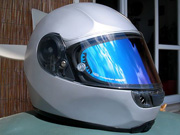 For motorcyclists, the most effective way to prevent a brain injury is to wear a helmet. An unhelmeted motorcyclist is 40 percent more likely to suffer a fatal head injury in a motorcycle crash than one wearing a helmet, according to the National Highway Traffic Safety Administration (NHTSA).
For motorcyclists, the most effective way to prevent a brain injury is to wear a helmet. An unhelmeted motorcyclist is 40 percent more likely to suffer a fatal head injury in a motorcycle crash than one wearing a helmet, according to the National Highway Traffic Safety Administration (NHTSA).
In Massachusetts and 19 other states, wearing a motorcycle helmet is the law for all riders. Twenty eight other states have laws requiring certain motorcyclists wear helmets. Three states, including New Hampshire, do not require motorcycle helmets for any riders.
Helmet use has grown in recent years as safety education has increased and manufacturers produce lighter-weight helmets. Helmet use increased from 48 percent of U.S. motorcyclists in 2005 to 67 percent in 2009, according to the NHTSA.
If you are a motorcyclist, it is important to protect yourself from motorcycle accidents as well as comply with the law. Our Boston motorcycle accident lawyers share some background information and tips for purchasing your motorcycle helmet:
Types of Helmets. Be sure to buy a helmet which is specifically designed for motorcycling. You may use different helmets for other activities, but these do not provide adequate protection in case of a motorcycle accident.
There are three types of helmets: full-face helmets; three-quarter, open-face helmets and “shorty” half helmets. A full-face helmet covers your entire face and provides the most protection. It has a moveable face shield which protects your eyes from debris and face in a motorcycle accident.
A three-quarter, open-face helmet has many of the same features, minus the face and chin protection of a full-face helmet. If you use an open-face helmet, it is recommended you also use a snap-on face shield or a pair of safety goggles when you ride.
The last type of helmet, a “shorty” half-helmet is not recommended by most safety organizations. It protects very little of your head and is the most likely to come off when you ride.
Safety Ratings. Since 1980, all adult-sized helmets for highway use have been required to meet the Department of Transportation (DOT) standards. Make sure your helmet has a DOT sticker before you purchase. The Snell Memorial Foundation is another safety testing laboratory for motorcycle helmets, though this rating is voluntary for helmet manufacturers.
Helmet Size. Most helmets are marked small, medium, large or extra large. Fit is important so measure your head at the largest circumference and contact your manufacturer to ask what size that measurement fits.
The goal is to avoid buying a helmet which is too large and can fall off. Here are a few things to note. The cheek pads should touch your cheeks without pressing uncomfortably. On full-face helmets, press on the chin piece. The helmet or face shield should not touch your nose or chin. There should be no gaps between your temples and brow pads. If the helmet has a neck roll, it should not push the helmet away from the back of your neck.
Replacing and Caring for Helmets. Follow the manufacturer’s instructions for caring for your helmet. It is best to use mild soap, water and a soft cloth. Avoid any petroleum-based cleaning fluid, which can cause the helmet to decompose over time.
Replace your helmet if the face shield is scratched as this will obstruct your view when riding. You should also replace your helmet if you’re involved in a motorcycle crash or if you notice any damage. Otherwise, many manufacturers recommend replacing your motorcycle helmet every two years.
Related:
- What You Should Know About Motorcycle Helmets, Motorcycle Safety Foundation
- Motorcycle and Bike Helmet Use Laws, Insurance Institute for Highway Safety
The Boston motorcycle accident lawyers at Breakstone, White & Gluck have over 80 years combined experience handling motorcycle accident cases in Massachusetts. If you have been injured, it is important to learn your rights. For a free legal consultation, contact us today at 800-379-1244 or 617-723-7676 or use our contact form.
Explosion Prevention for the BBQ and Grilling Season
 When the warm weather returns, many people look forward to grilling and choose propane gas grills. While these grills offer many advantages, propane is a highly combustible hydrocarbon gas which is compressed into a liquid form and placed inside a tank. It can explode in certain conditions, such as in a fire or with a tank leak.
When the warm weather returns, many people look forward to grilling and choose propane gas grills. While these grills offer many advantages, propane is a highly combustible hydrocarbon gas which is compressed into a liquid form and placed inside a tank. It can explode in certain conditions, such as in a fire or with a tank leak.
Some 6,500 barbecue grill fires injure Americans each year, accounting for a property loss of over $27 million, according to the U.S. Fire Administration, a division of Federal Emergency Management Agency (FEMA). The majority of these grill fires result from accidents and explosions related to malfunctioning gas grills.
Now as you set your grill up for the summer is the best time to learn how to properly clean and handle your propane gas tank and grill. The Boston personal injury lawyers at Breakstone, White & Gluck offer these tips to help you grill safely:
- Propane is an odorless gas with an odorant called ethanethiol added to help detect leaks. If you are near a propane tank and smell this gas, leave immediately and call your town’s fire department.
- Read the manufacturer’s instructions for your grill and if you need, contact customer support.
- Transport your propane tank to the refill station or hardware store in a standing position. Use a box or carrying case.
- Drive directly to and from the hardware store or refill facility. Do not make other stops.
- Store the propane gas tank outside your home with the grill and do not take it inside for any reason. This includes not taking it inside your garage or porch or leaving it on a deck attached to your home.
- Operate your propane gas grill and tank as far away from your home as possible.
- Most grills are now made with a safety device that prevents gas flow when the tank is disconnected. But always make sure your propane tank valve is closed when you disconnect to prevent fires and explosions.
- If you are having trouble heating your grill, do not keep raising the temperature. Check your manufacturer’s manual for instructions or call the company’s customer service phone number.
- Have propane gas equipment inspected periodically by a professional for possible leaks or malfunctioning parts. This will help prevent an explosion.
- Check your manufacturer’s manual for cleaning instructions. Turn the grill off and wait until it is cool. Lift the cover, inspect cooking surfaces and remove the cooking grids and spray with mild oven cleaner.
Related:
Propane Safety, National Fire Protection Association
What To Do After An Explosion
Read More
Bay State Bike Week Starts Monday; How to Participate as a Cyclist, Pedestrian or Driver
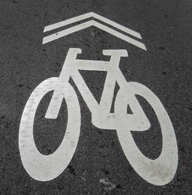 Bay State Bike Week starts Monday, May 14 and runs through Sunday, May 20. The annual celebration features several days of activities and educational programs throughout Massachusetts.
Bay State Bike Week starts Monday, May 14 and runs through Sunday, May 20. The annual celebration features several days of activities and educational programs throughout Massachusetts.
MassCommute Bicycle Challenge
Each year, one of the most anticipated events is the MassCommute Bicycle Challenge. For this one week, employees, students and others participate in teams to see who can pedal the most miles in the name of reducing traffic congestion, helping the environment and making time for fitness. Click the above link for information on how to participate.
Massachusetts Bike/Walk Summit on May 17
One event to watch this year is the Massachusetts Bike/Walk Summit on Thursday, May 17 at the State House. The event is co-sponsored by MassBike and WalkBoston, which seek to pass the Vulnerable Road Users Bill. If passed, the bill would increase fines for motorists who kill or injure vulnerable users. The term “Vulnerable Road Users” would include pedestrians, a person operating a bicycle, handcycle, tricycle, skateboard, roller skates, in-line skates or non-motorized scooter.
The bill was filed in January 2011 and is now in the Joint Committee on Transportation. MassBike has until June 1 to persuade legislators to advance the bill. The bill is supported by WalkBoston, Massachusetts Public Health Association, Conservation Law Foundation, Boston Cyclists Union, and Transportation for Massachusetts. Click the above link for information on how to participate.
Other Events
Bay State Bike Week will feature events and activities for all ages throughout the state, from Boston to Worcester to western Massachusetts. Most events are open to the public for free and are a great opportunity to learn more about cycling and the growing opportunities in Massachusetts. Click the above link for the full calendar.
Read More
Workplace Accidents Killed 58 Massachusetts Workers in 2011
 Fifty eight workers lost their lives on the job last year in Massachusetts. The average fine in closed investigations into those deaths was less than $7,000.
Fifty eight workers lost their lives on the job last year in Massachusetts. The average fine in closed investigations into those deaths was less than $7,000.
The Massachusetts Coalition for Occupational Safety and Health (MassCOSH) released the figure in its annual report at Workers’ Memorial Day on April 28. In “Dying for Work in Massachusetts,” the group reported firefighters and construction workers again account for the majority of workplace deaths in Massachusetts. The group called for reforms such as strengthening OSHA regulations to prevent construction accidents and passing new state laws to protect temporary workers.
“It is deplorable that so many workers still die or are severely injured in workplace accidents,” said Boston personal injury lawyer David White of Breakstone, White & Gluck. “Employers must be held accountable when they fail to follow safety requirements and cause injuries or deaths.”
Breakstone, White & Gluck is a proud sponsor of MassCOSH, an organization with a great reputation for protecting workers and improving workplace safety.
In 2011 in Massachusetts, the average fine in the death of a worker was $6,490. MassCOSH said this low cost encourages employers to disregard OSHA regulations.
The group noted there is no consistent trend in the number of worker deaths. But in 2011, the number of workers lives’ lost rose 11, up from 47 in 2010.
Thirteen firefighters died in 2011, two as the result of injuries sustained while responding to fires. Another firefighter was crushed while performing routine vehicle maintenance. Ten others died due to work-related cancer and heart disease.
Construction accidents accounted for eight wrongful deaths. Deaths were also reported in the human services and commercial fishing industries.
MassCOSH reports workers are dying in four ways: motor vehicle accidents and incidents; construction falls; workplace violence and drowning. Falls from ladders, roofs and trees accounted for 20 percent of all workplace deaths. Construction accidents were involved in 14 percent of workplace deaths, including three men who were killed in electrocutions and explosions.
MassCOSH Reforms
The advocacy organization for workers’ rights is calling on state and federal lawmakers to make a number of changes. These include:
Proposed Changes at the Federal Level:
- Strengthen OSHA regulations, with one measure including criminal prosecution.
- Overhaul OSHA’s system for regulating toxic chemicals.
- Better protect immigrant workers by increasing the number of bilingual investigators.
- Improve whistleblower protections.
Proposed Changes at the State Level:
- Full implementation of Executive Order 511, so all state agencies have committees which ensure national health and safety standards are being met.
- Make improvements to Massachusetts workers’ compensation laws so coverage is provided to all injured workers.
- Pass the “Temporary Worker Right to Know Law,” which would increase state oversight and ensure that temporary workers are provided written notice of job assignments, supervisors, wages and other key details.
Motorcycle Accidents Are Top Concern During Motorcycle Safety Awareness Month
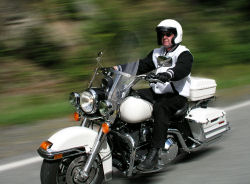 May has arrived and as motorcycling season begins, the National Highway Traffic Safety Administration (NHTSA) is observing Motorcycle Safety Awareness Month.
May has arrived and as motorcycling season begins, the National Highway Traffic Safety Administration (NHTSA) is observing Motorcycle Safety Awareness Month.
The national initiative aims to encourage drivers and motorcyclists to “share the road” and highlights that motorcycles are vehicles with the same rights and privileges as any other motor vehicle on the road.
This is an important point because most motorcycle accidents involve passenger vehicles and trucks. Many motorcycle accidents result from a lack of understanding and awareness on the part of both or either party. Many times, drivers will say they fail to see motorcyclists until just before an accident.
In 2009, motorcyclists were 25 times more likely than passenger vehicle occupants to die in a crash, according to the NHTSA. Motorcyclists were five times more likely to be injured based on miles traveled.
But motorcyclists can take a number of safety steps to protect themselves on the road. The Boston motorcycle accident lawyers at Breakstone, White & Gluck share a few motorcycle safety tips:
Wear a Helmet. Wearing a helmet is the best way to protect yourself from serious head injury. An unhelmeted motorcyclist is 40 percent more likely to suffer a fatal head injury in a motorcycle crash than one wearing a helmet, according to the NHTSA. Massachusetts is one of 19 states which require all motorcyclists to wear helmets. State law also requires all scooter and “low-power” riders to wear helmets.
Select a full-face helmet for the best protection. An open-faced helmet provides the next highest level of safety.
To select the right helmet, look for one which meets Department of Transportation (DOT) standards. All adult helmets are required to meet this standard and it will be clearly labeled on the helmet. The Snell Memorial Foundation is another well-respected testing organization to seek out, but helmet manufacturers are not required to meet its standards.
Take a Safety Class. Take an annual class on motorcycling safety to learn important techniques such as splitting lanes and how to handle road conditions such as uneven pavement and railroad tracks.
Wear Brightly Colored Clothing. Your goal is to make yourself as visible as possible to drivers during the day as well as night. Consider bright colors for your clothing and helmet.
Look in the Car’s Side View Mirrors. On the road, your best position is to be able to see the driver’s eyes in the side view mirror. If you cannot, you are in the vehicle’s blind spot, meaning the driver cannot see you in the mirror when he makes a driving decision.
Splitting Lanes. This is when a motorcycle moves in between two vehicles in separate lanes. Make sure you have the experience to make this move and make sure drivers around you are alert.
Avoid Riding in Inclement Weather. The risk for personal injuries increase in the rain and other bad weather conditions.
Related:
- Motorcycles, National Highway Traffic Safety Administration
- 7 Tips for Motorcycle Safety, Massachusetts Department of Transportation
- Motorcycle and Bicycle Helmet Use Laws, Insurance Institute for Highway Safety
- Motorcycle Safety Awareness Month Reminds Drivers, Riders to Share the Road, Consumer Reports
The Boston motorcycle accident lawyers at Breakstone, White & Gluck have over 80 years combined experience handling motor vehicle and motorcycle accident cases in Massachusetts. If you have been injured, it is important to learn your legal rights. For a free legal consultation, contact us today at 800-379-1244 or 617-723-7676 or use our contact form.
Massachusetts Social Host Law: Safety During Prom Season
 As prom and graduation season begins, parents are asked to speak to their teenagers about the dangers of drinking and driving.
As prom and graduation season begins, parents are asked to speak to their teenagers about the dangers of drinking and driving.
Anyone under 21 who drinks or possesses alcohol in Massachusetts can be charged criminally. Anyone who furnishes alcohol to a person under the age of 21 can also be prosecuted. Parents who allow underage drinking in their home may be held financially liable
But many people are unaware of their responsibilities under the Massachusetts social host responsibility law. Anyone who provide alcohol to teens and allow them to consume alcohol in their home may face serious consequences, including imprisonment and fines.
“Safety is the most important point in any conversation about drinking and driving,” said Boston attorney David W. White. “It is particularly important that parents have zero tolerance for underage drinking in their homes, and obviously they must not supply any alcohol to minors. Providing even a small amount of alcohol to an underage drinker may result in a large civil judgment if it contributes to an accident.”
White urged parents to intervene to ensure that prom celebrations do not include alcohol and to make sure that prom season does not result in needless injuries or loss of life.
Click here for questions and answers about the Massachusetts social host responsibility law.
Read More
April is Distracted Driving Awareness Month
 Text messaging while driving creates a car accident risk 23 times worse than driving while not distracted, according to the U.S. Department of Transportation. This statistic is alarming because while texting behind the wheel is a preventable act, more people than ever are using cell phones while driving, to make calls and text.
Text messaging while driving creates a car accident risk 23 times worse than driving while not distracted, according to the U.S. Department of Transportation. This statistic is alarming because while texting behind the wheel is a preventable act, more people than ever are using cell phones while driving, to make calls and text.
Texting while driving is one of the behaviors being highlighted during April’s Distracted Driving Awareness Month: One Text or Call Could Wreck It All. Many states are using the month, sponsored by the DOT, to increase awareness and law enforcement efforts.
In 2010, over 3,000 people were killed in distracted driving crashes. in the U.S. Distracted driving behavior includes texting while driving and cell phone use, but also other activities that take a driver’s attention off the road. This can include: putting on makeup, grooming, talking to others in the car and GPS use. DOT officials ask drivers to consider distracted driving behavior as any behavior that takes your hands off the wheel, your vision off the road or your mind off driving.
But cell phone use gets the most attention. As cell phone users have increased over the years, so have car accidents related to texting while driving and talking on a cell phone. Today, 9 out of 10 Americans own a cell phone and users are getting younger and younger. The National Literary Trust reports 85 percent of children in this country own cell phones, compared to the 73 percent who own books at home.
Some 37 states, including Massachusetts, ban texting while driving. Ten states, D.C., Guam and the Virgin Islands prohibit drivers from using handheld cell phones while driving. No state bans all cell phone use behind the wheel.
Distracted Driving Awareness Month is an opportunity to assess your driving habits. Our Boston car accident lawyers offer a few ways you can reduce distracted driving in the car:
- Do not talk on your cell phone or text message while driving.
- If you are tempted to use your cell phone, keep it in a place you will not answer or check it when stopped at intersections.
- Keep your GPS mounted on the windshield and enter the the address where you are heading before you start your trip. Stop at the side of the road if you need to make adjustments to the GPS.
- If you are using a printed map, familiarize yourself with your route and plan to make stops.
- Keep eating and drinking to a minimum.
- If you are traveling with a child, give them a book to occupy them. If you are traveling with several children, explain how they must behave in the car so you can focus on the road.
- Do not watch videos.
- Do not apply make-up, comb your hair or perform other grooming activities
Related:
- April is Distracted Driving Awareness Month, U.S. Department of Transportation
- The Growth of Mobile Into 2011
- Cell Phone and Texting Laws, Governors Highway Safety Association
Boston’s Hubway Bike-Share Network Now Fully Launched for Year
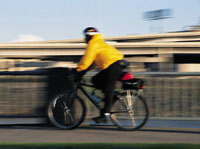 Boston’s Hubway bike-sharing system returned to full operation Sunday, when over 60 bike stations began offering rentals for the new season.
Boston’s Hubway bike-sharing system returned to full operation Sunday, when over 60 bike stations began offering rentals for the new season.
The New Balance Hubway had re-opened many stations for the spring on March 15. The program began last July, with 61 stations and 610 bicycles. It was widely used with over 140,000 rides logged between July 28 and November 30, when the program ended for the season. One highlight of the season was the program saw no serious bike crashes requiring ambulance response and only two bike accidents overall.
Boston Bikes, which manages the program, is making bike accident prevention and safety a top priority again this season. It has arranged with a number of local retailers to offer discounted bike helmets. Click here for a list.
The program is experimenting with new station locations this year, including the Boston Convention and Exhibition Center, Seaport Hotel and Cambridge Street in downtown Boston.
The Hubway offers $85 annual memberships or two types of casual memberships: $12 for three days or $5 for 24 hours. Rides less than 30 minutes are free with any membership. Longer rides range in prices. Annual members receive a 25 percent discount.
The program is operated by Alta Bicycle Share in partnership with Boston Bikes, an initiative of the City of Boston. It is partially funded by the Federal Transit Administration. Alta Bicycle Share of Portland, Oregon offers similar programs in Washington D.C. and Arlington, Virginia. It has been selected to manage Chicago’s first bicycle sharing program which will launch this summer.
In Boston, there are plans to expand the program into Roxbury, Dorchester, Jamaica Plain and Charlestown, Back Bay and downtown. Nearby, Cambridge, Somerville and Brookline plan to launch 30 stations this year.
Hubway users can find stations by visiting the Hubway website. The website provides a map of bike kiosks.
Related:
Recalled Birth Control Pills: Lo/Ovral-28, Norgestrel and Ethinyl Estradiol
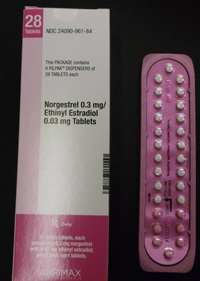 Pfizer Inc. has voluntarily recalled certain lots of birth control pills which may contain ingredient errors or out-of-sequence packaging which could have exposed women to a risk for unintended pregnancy.
Pfizer Inc. has voluntarily recalled certain lots of birth control pills which may contain ingredient errors or out-of-sequence packaging which could have exposed women to a risk for unintended pregnancy.
In January, Pfizer recalled 14 lots of Lo/Ovral-28 (norgestrel and ethinyl estradiol) Tablets and 14 lots of Norgestrel and Ethinyl Estradiol Tablets (generic) for customers in the U.S. market. The defective pills were distributed to warehouses, clinics and retail pharmacies nationwide.
An investigation by Pfizer found that some blister packs may contain an inexact count of inert or active ingredient tablets and that the tablets may be out of sequence. Pfizer recalled the tablets on January 31, 2012, with knowledge of the Food and Drug Administration (FDA). Pfizer said the error has been corrected.
The tablets were manufactured and packaged by Pfizer Inc., commercialized by Akrimax Rx Products and labeled under the Akrimax Pharmaceuticals brand. The medicine is packaged in blister packs of 21 tablets of active ingredients and seven tablets of inert ingredients. Click the link below for packaging numbers involved in the recall.
The product liability lawyers at Breakstone, White & Gluck are reviewing cases for women who have taken defective lots of these birth control pills and have experienced or are experiencing an unplanned pregnancy. Contact us today at 800-3791244 or 617-723-7676 or use our contact form. Read More
Head Injuries and Concussions Being Tracked Among Massachusetts Student Athletes
 More than 330 students suffered head injuries and concussions last fall at 26 high schools in the region, according to a survey by The Boston Globe. This is the first time Massachusetts high schools and middle schools have been required to report injuries under a new state law.
More than 330 students suffered head injuries and concussions last fall at 26 high schools in the region, according to a survey by The Boston Globe. This is the first time Massachusetts high schools and middle schools have been required to report injuries under a new state law.
Football accounted for the majority of injuries, with 207 reported head injuries. Girls soccer followed with 85 head injuries, compared with 46 among boy soccer players.
Robert Cantu, a clinical professor of neurosurgery at Boston University School of Medicine, told theGlobe that football is the leading cause of head injuries among student high school athletes nationwide. He estimated that for every concussion recognized in football, 6 to 8 go unreported.
Concussions are a brain injury which can result when student athletes are struck in the head, collide with each other or engage in unsafe play. One recent study has documented how excessively heading the ball in soccer causes trauma to the brain as well. Symptoms can include headache, nausea, dizziness and confusion. Concussions have the best chance for recovery when given proper rest.
In 2010, Massachusetts passed a new law aimed at preventing concussions among high school athletes and protecting them from long-term injury. Since last September, students, parents and coaches have been required to receive annual training on recognizing and treating concussions; students who sustain concussions must obtain medical clearance before returning to play. Schools must report the number of injuries to the state Department of Public Health.
The 26 schools reported 338 head injuries. Marshfield and Newton South high schools reported the largest number of head injuries, followed by Lexington, Duxbury and Wakefield. Some coaches in these districts say the higher numbers reflect the community’s work to educate students and parents.
Some schools have gone beyond the requirements of the law and are utilizing ImPACT testing, a computerized cognitive test used to help evaluate whether a student is ready to return to the field. Some school districts are providing free physicals and staffing a doctor at every football game.
Finally, some athletic directors report their coaches are focusing on safe playing techniques while others are seeking new football helmets for players.
Related:
- Massachusetts Concussion Law
- Massachusetts Baseball Safety
- Massachusetts Interscholastic Athletic Association

